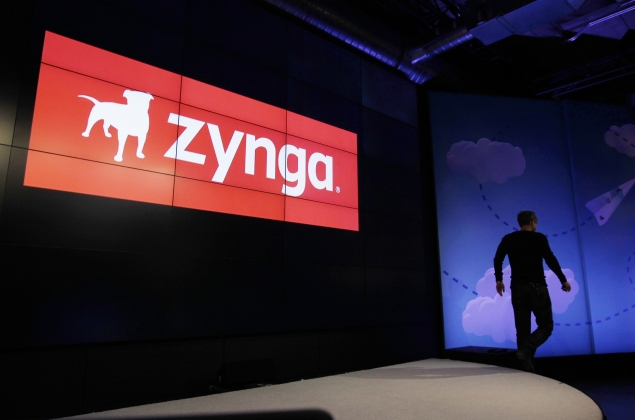- Home
- Games
- Games News
- Asian gamemakers muscling onto Zynga's turf
Asian gamemakers muscling onto Zynga's turf

And, so the industry legend goes, the "virtual good" was born. In the years since, digitally created items for games and social media - from beers on Facebook to weapons in role-playing worlds have grown into a $15 billion globe-spanning business. They helped generate the likes of Zynga Inc and underpin a fast-expanding online-gaming industry.
Now, companies such as Nexon that pioneered the model across Asia are muscling onto Zynga's turf, hoping to cash in on fast-growing U.S. spending by bringing their distinct Asian brand of fast-paced "freemium" games free with optional in-game purchases.
With PC sales stagnating even in China, the industry's heavyweights are increasingly doubling down on the mobile space and targeting the Western market as more smartphones and tablets land in users' hands. Encouraged also by slowing growth in casual games on Facebook - basic time-killers where game play can be measured in minutes rather than hours they have stepped up their investments this year.
"The emphasis of the Asian publishers is to successfully set foot in Western markets, and that gives you a blueprint of what's to come," said Joost van Dreunen, managing director of digital goods intelligence firm SuperData Research. "The free-to-play games for mobile are where we identify huge growth."
Asian gaming bigwigs began exploring the Western market a few years ago with high-engagement, addictive and often hard-core Web-browser titles. But this year has brought a spike in activity that threatens to undermine Zynga's own efforts to diversify into mobile gaming and wean itself off Facebook Inc.
Japanese social gaming powerhouse DeNA Co aims to enlarge its social and mobile gaming network Mobage in America. It is releasing games based on the Marvel superhero and Transformers franchises. GREE Inc has bought two San Francisco-based mobile game developers since May and is spending heavily to acquire American users.
Nexon, which went public in December, also wants to be a prominent American player and is gearing up for a massive launch of "Epic of the Three Kingdoms" in 3D for PC and mobile devices.
The new competition comes at a bad time for Zynga, the $2 billion company behind "FarmVille" that gets over nine-tenths of its revenue selling virtual goods: maps, weapons and other items that give players an edge that are offered for small amounts, often under $1, as enhancements in games that are free to download and play.
The company helped convert large numbers of nongamers into players through colorful, less time-consuming casual games like "CityVille," but is now struggling to monetize mobile games, stanch executive losses, and resuscitate a floundering stock that has dropped 70 percent since the beginning of this year.
"Zynga and other American game companies are already feeling some pain from the marketing and advertising side from GREE in particular, but also DeNA, in terms of the significant amount that they are spending on acquiring users in the U.S.," said Colin Sebastian, an analyst at Robert W. Baird.
Not a fad
Asia's gaming titans hope the United States will be the source of the industry's next phase of expansion, perhaps at Zynga's expense, in a reversal of how Western companies typically rely on emerging markets to bolster growth.
With the proliferation of mobile devices the worldwide market for virtual goods will surpass $20 billion by 2015, according to SuperData Research. U.S. gamers spend much less than Asians, but their expediture is growing faster.
Revenue from U.S. virtual goods is expected to grow 36 percent to $3 billion this year and double to about $6 billion in two years, versus shrinking sales of traditional video game products, according to Bonnie Ho, lead research analyst at Inside Network.
The Asian market is upwards of $10 billion.
Slower Internet speeds in America, pose a challenge for free games that stream on browsers or on mobile. For instance, the 16 megabyte per second average Internet speed in South Korea is more conducive to the online gaming business than the U.S average rate of about 7 megabytes per second.
But with expanding infrastructure Google introduced a 1 gigabyte per second service in Kansas City, Missouri, in July that barrier is gradually dissipating.
The trick is to give U.S. gamers reason to spend via more immersive, or high-engagement, games. Analysts say the casual crowd is less likely to spend for that extra edge and stay absorbed than the intensely competitive action-gamers that Nexon and others draw.
In the U.S., conversion rates for transforming a casual player into one who will splurge on virtual goods have doubled to around 3.1 percent since last year, according to van Dreunen.
To keep up sales of virtual items, Zynga may need to launch more immersive titles - strategy games, even action-shooters and capture robust growth in the mobile space.
"When you deal with a non-core, non-dedicated, non-loyal segment, it's almost like you have to treat them like they are ten-year-olds with attention deficit disorder," Jesse Divnich, an analyst at video game research firm EEDAR said.
That means constantly designing new games, introducing fresh elements into existing ones, and otherwise giving players a reason to keep coming back and hopefully spring for items.
Zynga said last month it will buy digital games studio A Bit Lucky to offer "mid-core" games titles that sit between slickly produced, addictive videogames and basic casual games such as its popular Words with Friends.
"In Asia and beyond, this (free-to-play) model is here to stay, and it's definitely not a fad," said Allison Luong of Pearl Research.
Asian domination
Over a decade ago, piracy in Asia killed its traditional business of selling games in boxes that are then installed on computers. Bootleg games became widely available for a fraction of the cost, spurring legitimate publishers toward experimenting with the then-novel idea of online free-to-play games. High-speed Internet services brought in a steady stream of players.
All that fed the growth of the regional virtual goods industry. China is the world's largest Internet market. Around 60 percent of its 540 million users play online games, making them highly lucrative.
"In China our business grew 50 percent year over year. That's just a really good indication of what the opportunity is," said Nexon Chief Financial Officer Owen Mahoney.
Zynga now acknowledges the importance of gaining a foothold in Asia's gaming scene, even as Asian players make their way into the U.S. market. In 2010 it bought Tokyo-based social games maker Unoh to lead its Japanese operation. Earlier this year, it launched Pokemon-like role-playing game "Montopia" and social game "Ayakashi" in Japan.
This summer it took "Draw Something" to Chinese audiences, partnering with social network Sina Weibo.
For now, over half of $75 billion in U.S. videogames revenue comes from traditional packaged games. The mobile device explosion will change that proportion in coming years.
"The install base is growing as more tablets, phones hit the market everyday. But there are still some roadblocks on how do we really maximize the growth opportunity here," said Divnich.
Copyright Thomson Reuters 2012
Get your daily dose of tech news, reviews, and insights, in under 80 characters on Gadgets 360 Turbo. Connect with fellow tech lovers on our Forum. Follow us on X, Facebook, WhatsApp, Threads and Google News for instant updates. Catch all the action on our YouTube channel.
- Samsung Galaxy Unpacked 2026
- iPhone 17 Pro Max
- ChatGPT
- iOS 26
- Laptop Under 50000
- Smartwatch Under 10000
- Apple Vision Pro
- Oneplus 12
- OnePlus Nord CE 3 Lite 5G
- iPhone 13
- Xiaomi 14 Pro
- Oppo Find N3
- Tecno Spark Go (2023)
- Realme V30
- Best Phones Under 25000
- Samsung Galaxy S24 Series
- Cryptocurrency
- iQoo 12
- Samsung Galaxy S24 Ultra
- Giottus
- Samsung Galaxy Z Flip 5
- Apple 'Scary Fast'
- Housefull 5
- GoPro Hero 12 Black Review
- Invincible Season 2
- JioGlass
- HD Ready TV
- Latest Mobile Phones
- Compare Phones
- Realme P4 Lite
- Vivo V70
- Vivo V70 Elite
- Google Pixel 10a
- Tecno Camon 50
- Tecno Camon 50 Pro
- Lava Bold N2
- Vivo V60 Lite 4G
- LG Gram 14 (2026)
- Asus Vivobook 16 (M1605NAQ)
- Infinix Xpad 30E
- Brave Ark 2-in-1
- Amazfit T-Rex Ultra 2
- boAt Chrome Iris
- Xiaomi QLED TV X Pro 75
- Haier H5E Series
- Asus ROG Ally
- Nintendo Switch Lite
- Haier 1.6 Ton 5 Star Inverter Split AC (HSU19G-MZAID5BN-INV)
- Haier 1.6 Ton 5 Star Inverter Split AC (HSU19G-MZAIM5BN-INV)


![[Partner Content] OPPO Reno15 Series: AI Portrait Camera, Popout and First Compact Reno](https://www.gadgets360.com/static/mobile/images/spacer.png)









